Prayer for the Living Read online
Page 7
The church was just opposite the bus stop, at the end of a short street. Its modest elongated dome made an enchanting shape in the night sky.
‘It’s like something in a dream,’ she said.
The poet received the presence of the church without amazement, almost coolly.
‘Something is missing from the church,’ he said simply.
‘What’s missing?’
‘I don’t know. But I feel the absence of something.’
‘What?’
The poet was silent. This absence that he felt made him unusually aware.
He began looking where he shouldn’t be looking. Then he saw it.
‘I see one,’ he said.
‘What?’
He directed with his gaze. Then she saw it too. There it was in the middle of the street. It was as clear as an illumination. It was composed of the square shapes of manholes. Beautiful in form and perspective, a marvel of the golden mean, it was a perfect cross. It led the eye to the unusually situated church; and the church, by indirection, returned the eye to the perfection of the cross. The two things could only be seen from the bus stop.
‘It’s a secret sign,’ she said.
‘Meant only for those inclined to see it.’
‘We don’t really notice things, do we?’
‘No, we don’t. We look, but we see nothing.’
‘We notice nothing.’
‘Why do you think that is?’
‘I don’t know,’ she said. ‘Maybe we’ve drained away from the world the mystery with which it is made.’
Staring at the conjunction of the church and the sign, they pondered many possibilities in silence. They had the sense of a secret world at work in our world. They had an intuition of many things besides, too incredible but perfectly possible. Notions that couldn’t be shared except with the like-minded.
Then the bus, which had been unaccountably delayed at the red lights, glided into the bus stop. It was empty. The driver smiled at them. They got on, climbed upstairs, took seats at the large front windows, and gazed at the unseen world.
Tulips
First you go to an exhibition. You see a Hoover machine and shiny adverts and a huge punani being made love to by the artist. You see vitrines and cartoon characters in super realism. The gallery is big and has high ceilings and high white walls and staircases that are works of art.
It’s not the exhibition you go there for, but the space. You are there to see the space and how it will harbour a cave and an open matchbox and the core of an apple on the floor. You don’t remember if there were flowers in the exhibition.
It’s getting dark and you can hear the trains grinding on the tracks as they run past overhead. The sound of the rhythm of trains punctuates the November night.
You are there with someone who is pregnant and the spirit of this child with a half smile follows you around. At the end of the exhibition the girl behind the till gives you a present of a book for the child not yet born but who somehow communicates her presence.
There were flowers on a ledge near the entrance but we didn’t notice them when we came in. They weren’t tulips.
*
On another day we had a filmed conversation in the gallery. Then we had dinner upstairs in the pharmacy or was it the hospital. Everyone was healthy and the food was good. We talked about art.
There was a man sitting next to my friend’s wife. He looked unmistakably Dutch. He had a pile of brochures. The conversation for the rest of dinner was about tulips.
The Dutchman was a tulip salesman. I expected him to have at least a passing resemblance to a tulip. I had a definite image of what a tulip looked like till I looked in the brochures. There were a thousand permutations. The tulip salesman sold hundreds of thousands of tulips every year. I didn’t know there were that many on the planet. I saw tulips of all colours and sizes, but not all shapes. I didn’t see a spherical tulip, nor a triangular one, nor a tulip that looked like a dog. There was talk of tulip soup and tulip burgers. There was no talk of the tulip crash.
Towards the end of dinner I was surprised to discover that the salesman had more than a passing resemblance to a blonde tulip I saw in the brochure. I walked across the bridge after dinner and the word tulip kept repeating itself in my head. It was a very cold night and I paused in the middle of the bridge and stared down into the dark river of tulips. All the big houses with their lighted windows wove themselves into tulip buildings and the bus rode by on tulip wheels.
When I got home my girlfriend asked me what the evening was like.
‘Lovely,’ I said.
‘How was Gavin?’
‘He was a tulip.’
‘Oh. How was Deborah?’
‘She was a tulip too, with a gorgeous hat.’
‘Interesting. How was dinner?’
‘Excellent.’
‘Really? What did you have?’
‘Tulip soup.’
‘Extraordinary. What did it taste like?’
‘It tasted like a poem I read one night when I was a kid.’
The Lie
There was once a king obsessed by the search for truth. After many years of being unable to get any closer to it, he chose an opposite method. He sent his courtiers, his wizards, philosophers, magicians, and even his fool on an important mission.
They were to travel to all corners of the world and find out from every man, woman, or child what constituted the greatest lie in the lives of human beings. He hoped that by finding out the greatest lie he would, by deduction, arrive at the greatest truth. He was so determined on this mission that he dedicated extensive resources to its fulfilment.
For many years his emissaries travelled all the lands of the earth asking people what they considered the greatest lie. After a long absence they returned to him. To each one he posed his questions. Their answers surprised him.
The first to return was the court librarian. He had lost a considerable amount of weight. The gifts he brought back with him were richly bound rare books from all over the world.
‘I don’t recognise you,’ said the king.
‘Your Majesty, I am the court librarian. I have been gone these seven years.’
‘I’m sorry I didn’t recognise you, but you are much changed.’
‘The journey has aged me. I have learnt much. Time on a quest is different from time in the library.’
‘What have you found to be the greatest lie?’
‘The greatest lie is that there is life after death.’
‘Why is this a lie?’
‘We have not been able to prove it.’
‘What is the effect of this lie?’
‘If there is no life after death then people can do whatever they want while they are alive. This breeds great audacity in evil deeds and a feeling that people can get away with anything. Those who believe there is no life after death are on the whole rather sad people. Life has no meaning for them. A life without meaning is a terrible thing, Your Majesty.’
The king lavished fine gifts on the librarian. The librarian departed and resumed his office.
The next to return was his chief horseman. His hair was white. He too had aged.
‘Who are you?’
‘I am your chief horseman.’
‘You’re much altered.’
‘The faster I travelled the less I discovered. I came to see that speed was a hindrance. So I travelled on foot. The things I learnt humbled me. I am now resolved to sit still.’
‘Perhaps your return will restore you to your love of horses. What did you learn to be the greatest lie?’
‘The greatest lie is that there is no life after death.’
‘Quite the opposite to what we heard before. Why is it a lie?’
‘We have been able to prove there is life after death. I met a very young girl who remembered her family from her last life. They were hundreds of miles away. She led us to them and on the way told us things about this family that only children from that family
could have known. There were many cases like this.’
‘I see,’ said the king. ‘What is the effect of this lie?’
‘Those who felt there was life after death did not fear death. This made a difference to how they lived. They were happier people. It seems, Your Majesty, that what we feel about death is the quality that most determines the kind of life we lead.’
The king sent him back to his stables with fine presents. The magician was the next to return. He was dressed in white. He had not aged at all. The king recognised him immediately.
‘You are my magician. Welcome back from your quest.’
‘Thank you, Your Majesty. I bring gifts from the Far East, lapis lazuli and gold. I have been gone seven years and have seen many wonders and evils. I have heard more lies than a man can withstand.’
‘You look exactly the same, but you seem different.’
‘The quest has altered me. I have seen so many kinds of magic that I am now determined to live a simple life without magic. Life seems to me now the greatest magic of all.’
‘We value the magic you brought to our court. Maybe your return will cure you of your renunciation. What is the greatest lie that you found on your journeys?’
‘The greatest lie I found was that people have been led to believe that when they grow up they will be happy.’
‘And is this not true?’
‘No, Your Majesty. It seems people grow sadder as they grow older. They look back on the period of their childhood as a paradise they have lost.’
‘What is the effect of this lie?’
‘Disappointment.’
‘Thank you, Court Magician. Our vizier will reward you for the quest you have undertaken. We hope that you return to your magic books renewed.’
‘Simplicity is my new magic, Your Majesty.’
The king nodded, a little sadly. The magician departed.
And so they returned, in a steady stream. One courtier said the great lie consisted in being told in childhood that people were good and that life was fair. The philosopher said that the great lie was that time was real.
‘Is time not real?’ said the king.
‘It seems time is unreal, an illusion.’
‘Does time not pass? Have you not been away for seven years?’
‘Time passes differently for different people,’ said the court philosopher. ‘For a lover waiting to see his beloved time is slow. To someone late for an appointment time is fast. People find time puzzling, Your Majesty. For an old man the memory of life is shorter than a day, and to a child the sense of the future is longer than eternity.’
The philosopher departed, with gifts. Then it was announced that the fool had returned from his travels. Of all his emissaries the king was particularly interested in the findings of his fool.
‘So, my fool, you have returned at last.’
‘Your Majesty, I am not sure I have returned at last. I have returned at fifth.’
‘But you have returned?’
‘I can still turn, when it is my turn to do so.’
‘What will you turn from?’
‘I could turn from myself, but heaven knows what I will turn into. Besides my coat will not let me.’
‘Why will your coat not let you, Fool?’
‘Because I am not a turncoat.’
‘I see that seven years away has not made you less a fool.’
‘Your Majesty, I see that the years here have not made you any less a king.’
‘Why should they?’
‘If one does one thing too long one ends up doing its opposite.’
‘How so?’
‘Time turns all things around.’
‘How is this possible?’
‘Because the world goes round.’
‘Have you seen it go round?’
‘I have become round since I have been away. That’s how I know it goes round.’
‘Enough of this banter,’ said the king. ‘Tell us your findings.’
‘The great lie, Your Majesty, is that your power is real.’
‘What do you mean by that?’ roared the king.
Unperturbed, the fool went on:
‘Your power is unreal. It is made of air. It consists of what we have conferred on you. You are our creation, our fiction. We have taken our power and given it to you. Then we forgot that you were made by us.’
‘Is this what you have brought back to me?’
‘No.’
‘There is more?’
‘There is more.’
‘What is it?’
‘The real lie, Your Majesty, is that we individuals have no power. We keep looking for power elsewhere. But we are powerful. On my travels I met a wise man who told me a great secret.’
‘What is the secret?’ the king asked, leaning forward.
‘The secret is that the least is the most, and the most is the least.’
‘What does that mean?’
‘Your Majesty, I am only a fool. I cannot do your thinking for you.’
The king glared at his fool. At a signal the soldiers seized him.
‘Behead him for his insolence!’
As he was being dragged away, the fool shouted:
‘If I am beheaded, Your Majesty, the joke will be on you.’
‘Stop!’ said the king. ‘Bring him back!’
The soldiers brought back the fool.
‘What joke?’
‘There will be two jokes.’
‘What are they?’
‘The first is that the king killed his fool because his fool told him that he was a king.’
‘And the second?’
‘That the king asked for the greatest lie but couldn’t handle the truth.’
The king contemplated the fool for a while. Then the vizier came and whispered something in the king’s ear.
‘We will spare him for now,’ the king said. The fool bowed.
‘Your wisdom surpasses your power,’ the fool said.
The king dismissed him, and awaited the other emissaries. The next day a child was brought to him.
‘I know what the greatest lie is,’ said the child.
‘What is it?’
‘The greatest lie is that when people die they are gone forever.’
‘Why is this a lie?’
‘Because three days after my mother died I saw her standing over my bed. She told me that all would be well.’
‘But were you not dreaming?’ the king asked.
‘That’s what everyone says. But I was wide awake. Anyway, I saw her again.’
‘Where?’
‘Three days later, in the marketplace.’
‘What is the lie?’
‘That the dead are dead.’
The king pondered this. He gave the child a small gift. He awaited others. A blind man was brought before him.
‘The greatest lie, Your Majesty, is that the blind do not see.’
‘Is this true?’
‘At first it was true of me. But one day I discovered I could see with eyes I didn’t know I had. But I see in a strange light, as if everything were lit from within.’
‘What is the lie?’ asked the king.
‘It is twofold,’ the blind man said. ‘The first is that the blind cannot see. The second is that those who have sight can see. Maybe the latter is the greatest lie.’
The blind man left, without any help, tapping his stick on the palace floor.
The king was struck by the blind man, but he awaited other messengers.
A few days later a woman was brought before the throne. She began wailing.
‘Love is the greatest lie!’
‘How so?’ asked the king.
‘I sought love and found nothing but ashes. Love has brought me more misery than anything else on earth. I have been abandoned, betrayed, deceived, and used. The poets sing too much about love, religion preaches it, but love as I have seen it is a name for something else.’
‘What can this be?’
‘Lovers deceive themselves. They project on to one another, and see someone who is not there. When they eventually see the real person, they love no more. Love is a screen, it is a mirror, it is a blindness, it is a lie.’
The king was perturbed by this, and sent the wailing woman away with gifts.
Then an old woman was brought before him. With the air of deep forests, with the rasping voice of an aged eagle, she said:
‘Of all the lies the greatest lie is truth.’
The king was taken aback by this remark.
‘How can truth be the greatest lie?’ asked the king.
‘Truth takes a thousand forms,’ said the old woman. ‘The truth of the fly is not the truth of the spider. The truth of your lowest servant is not that of the king. The truth of a man dying of a sword thrust is not the truth of the warrior plunging in the sword. The truth of fire is not that of ice. There is the truth of suffering and that of happiness, the truth of love and that of hate. The truth of death is not that of life. The skeleton speaks a different truth from the woman in the heat of lovemaking. Of all the things that have caused war and the greatest suffering, it is truth that is most responsible for them all. Every war is a war over truth. All sides dispute it. We all believe we have our truth. But no one has seen the truth. Some say God is truth, but none have seen God. Some say Love is truth, but none have seen Love. Truth is a mirage that has led man astray in the deserts of time.’
With this the old woman left, and the king was much diminished.
He had grown old awaiting his messengers. He had grown weary listening to the innumerable forms of the greatest lie brought to him over the years. Not a day passed in which he wasn’t presented with a version of the great lie. The king believed he had heard them all. He had heard all the lies about being human. He had heard about the lies that people tell themselves. Listening to all the lies had slowly drained him of life. All illusions fled from his heart. His spirit grew dry. There seemed nothing left of any splendour in the world.
The king had heard the lie in all its infinite forms. He had heard political lies, intellectual lies, and spiritual lies. Nothing that we see is as it seems: sight is a lie. Nothing that we hear is as it sounds: hearing is a lie. The senses deceive. Memory falsifies. Time is an illusion. Life is unreal. Death is unknowable. Even power succumbs to the law that what is given can be taken away.

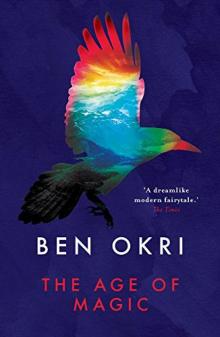 The Age of Magic
The Age of Magic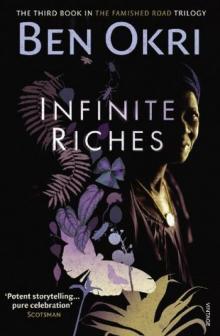 Infinite Riches
Infinite Riches Songs of Enchantment
Songs of Enchantment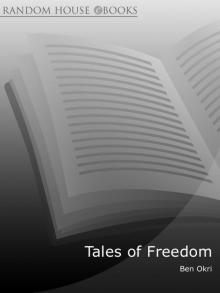 Tales of Freedom
Tales of Freedom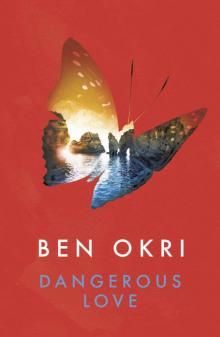 Dangerous Love
Dangerous Love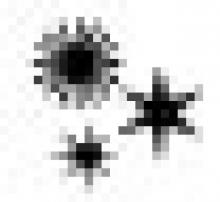 Starbook
Starbook The Famished Road
The Famished Road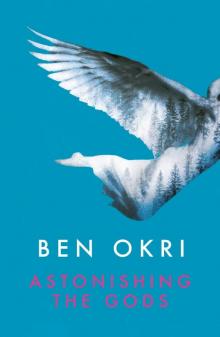 Astonishing the Gods
Astonishing the Gods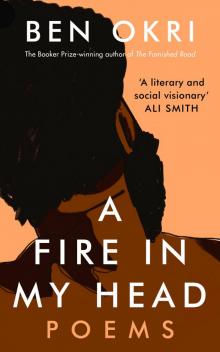 A Fire in My Head
A Fire in My Head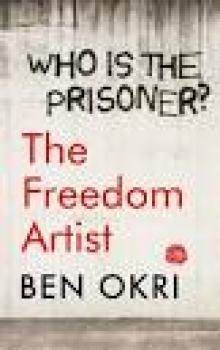 The Freedom Artist
The Freedom Artist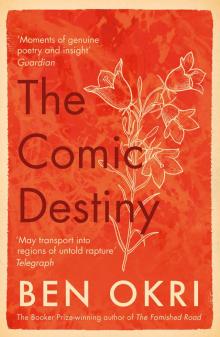 The Comic Destiny
The Comic Destiny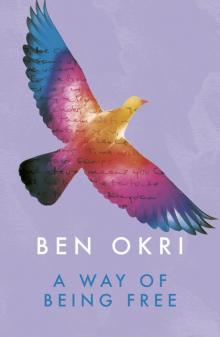 A Way of Being Free
A Way of Being Free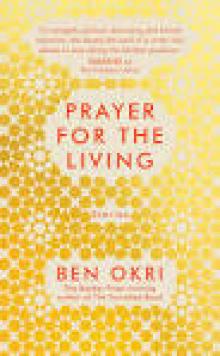 Prayer for the Living
Prayer for the Living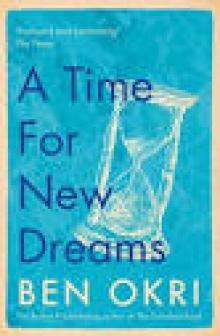 A Time for New Dreams
A Time for New Dreams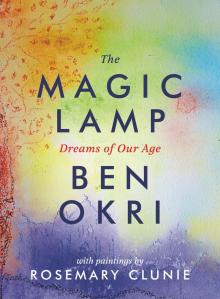 The Magic Lamp
The Magic Lamp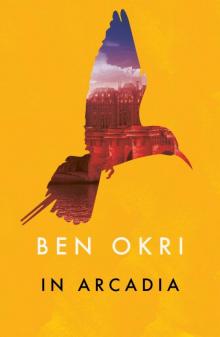 In Arcadia
In Arcadia